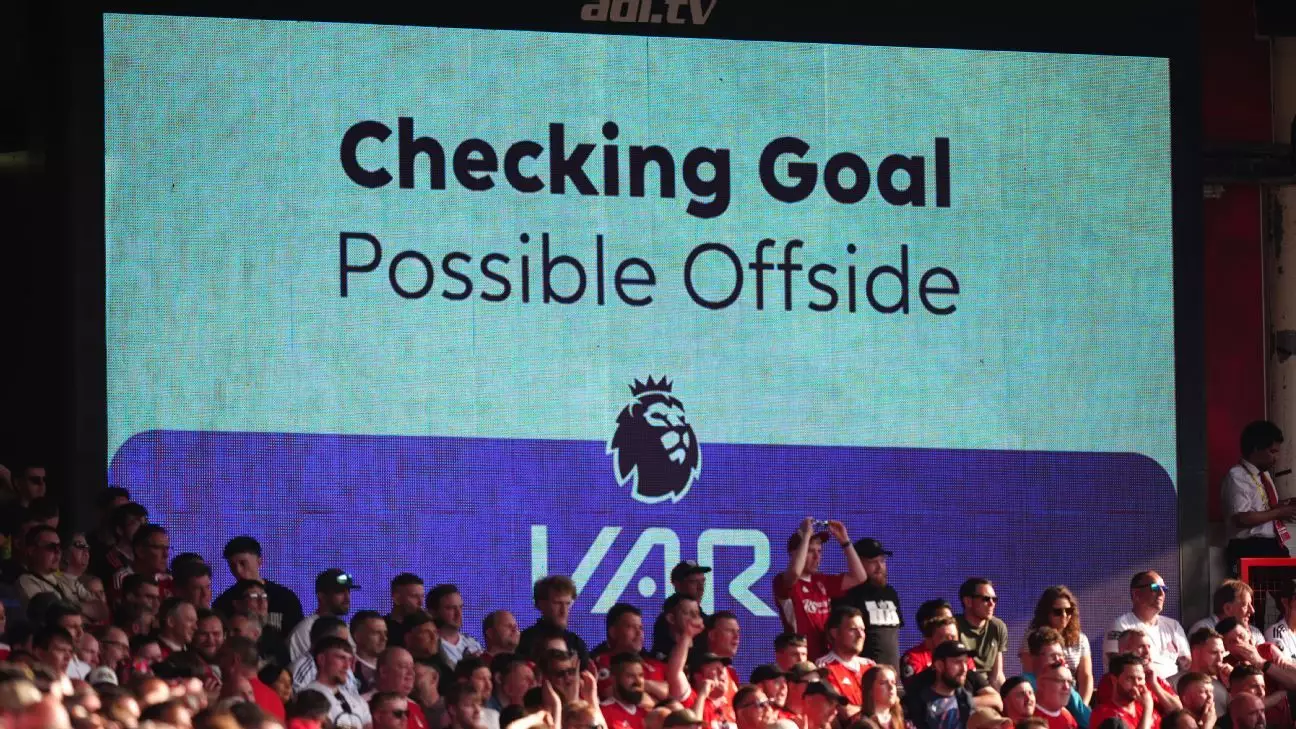Nottingham Forest, facing the rigors of a relegation battle last season, found themselves in the spotlight for all the wrong reasons when the English Football Association (FA) imposed a fine of £750,000 ($979,526) related to a social media post targeting video assistant referee Stuart Attwell. Following their painful 2-0 loss against Everton on April 21, 2023, the club took to their official social media channels to express their grievances. They accused the referee of bias, questioning the integrity of officiating during a match that held significant implications for both teams involved in the relegation fight.
Forest’s post specifically highlighted three key penalty decisions that they vehemently believed were mishandled, one of which implicated Everton’s Ashley Young in a contentious tackle that left Giovanni Reyna feeling aggrieved. The club’s use of social media as a platform for their frustrations prompted not only scrutiny but also official action from the FA, which deemed their comments a breach of conduct, specifically referencing FA Rule E3.1, which addresses integrity and the questioning of match officials.
The FA’s decision to impose a financial penalty underscores a growing trend in football where clubs face repercussions for their public statements. The governing body justified the fine by stating that Nottingham Forest’s comments implied bias and questioned the integrity of officiating. This rationale raises critical questions about the extent to which clubs can express discontent without crossing a line into conduct deemed inappropriate by regulatory bodies.
From the FA’s perspective, maintaining the integrity of match officiating is paramount to the sport’s overall reputation. Yet, one must examine the implications of silencing clubs for expressing valid concerns regarding refereeing standards. Should clubs be restrained from voicing their dissatisfaction, especially when consistent errors can influence outcomes in high-stakes matches? Forest’s management expressed their profound disappointment not just at the fine but at the size of the sanction, arguing that it was “wholly disproportionate.”
In the face of this hefty fine, Nottingham Forest has vowed to appeal the FA’s decision. Their reaction reflects a sense of injustice that resonates not just within the club but throughout the football community. If successful, this appeal could set significant precedents regarding the boundaries of club commentary on officiating. The club’s management maintains that their social media post was merely an expression of frustration with officiating that directly impacted their fight for Premier League survival.
Critics of the fine argue that this situation illustrates a broader issue of transparency and accountability within officiating in football. As clubs grapple with decisions that could relegate them, the stakes are incredibly high, and the importance of having an unbiased and fair officiating system is underscored. Forest’s appeal may serve as a rallying point for other clubs who feel equally marginalized by officiating decisions.
Refereeing Standards and the Role of VAR
What is perhaps most illustrative of Nottingham Forest’s plight is the ongoing conversation regarding the Video Assistant Referee (VAR) system itself. Proponents of VAR suggest that its introduction heralded a new era of improved decision-making in football. However, incidents like these, where clubs are left feeling victimized by what they perceive as VAR failures or questionable referee performances, highlight persistent discontent.
The insights of former referee Mark Clattenburg, who previously served as Nottingham Forest’s referee analyst, amplify the validity of Forest’s claims. He described the officiating during the Everton match as a “hat trick of howlers,” noting that not a single one of the contentious decisions was sent for VAR review. Such a dismissal raises concerns about the efficacy of VAR as a tool meant to rectify glaring errors in officiating. Clattenburg’s later departure from the club as their refereeing consultant amid a backlash over his criticism illustrates the complexities faced by those who choose to advocate for accountability in officiating.
As Nottingham Forest prepares for their appeal, the case opens a broader dialogue about social media’s role in modern football, the repercussions for clubs expressing discontent, and the ongoing challenges surrounding officiating standards. The balance between safeguarding the integrity of the game and allowing for legitimate concerns to be voiced remains delicate.
In a sport where every decision can have cascading repercussions on teams’ fortunes, particularly during the twilight of a season, it is crucial to foster an environment where clubs can challenge the status quo without fear of disproportionate penalties. As the appeal progresses, all eyes will be on Nottingham Forest—not just as they fight for survival on the pitch, but as they seek justice off it. Such instances, if left unaddressed, risk diminishing the spirit of the game and the principles of fair play that it upholds.

Leave a Reply